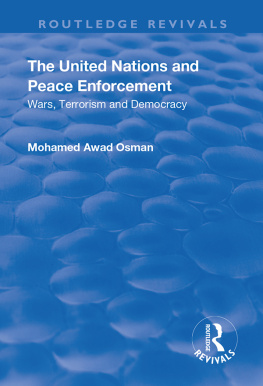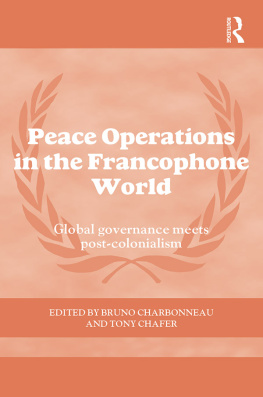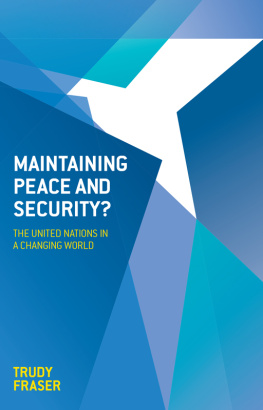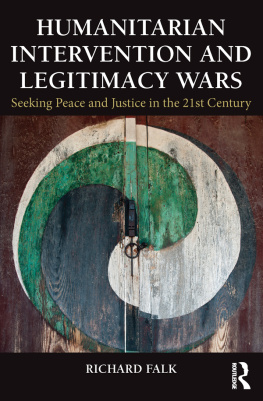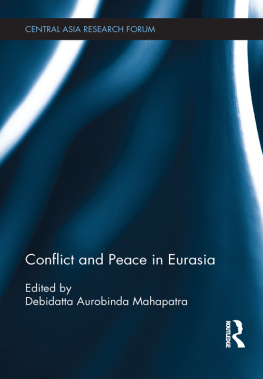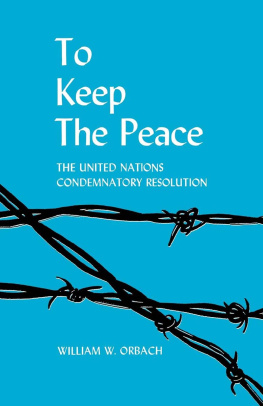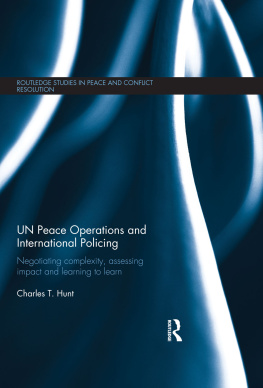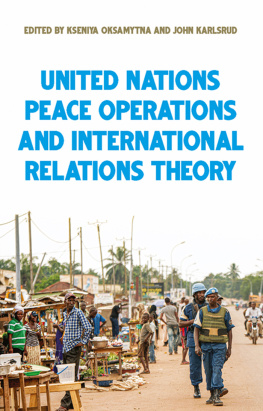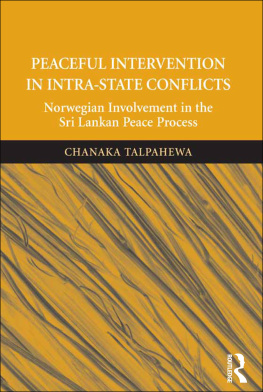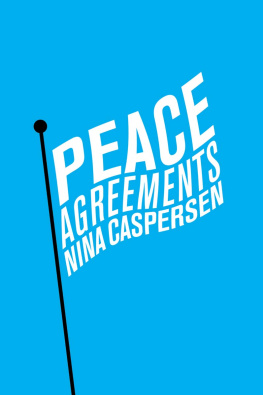THE UNITED NATIONS AND PEACE ENFORCEMENT
First published 2000 by Dartmouth Publishing Company and Ashgate Publishing
Reissued 2018 by Routledge
2 Park Square, Milton Park, Abingdon, Oxon OX14 4RN
711 Third Avenue, New York, NY 10017, USA
Routledge is an imprint of the Taylor and Francis Group, an informa business
Copyright Mohamed Awad Osman 2002
All rights reserved. No part of this book may be reprinted or reproduced or utilized in any form or by any electronic, mechanical, or other means, now known or hereafter invented, including photocopying and recording, or in any information storage or retrieval system, without permission in writing from the publishers.
Notice:
Product or corporate names may be trademarks or registered trademarks, and are used only for identification and explanation without intent to infringe.
Publisher's Note
The publisher has gone to great lengths to ensure the quality of this reprint but points out that some imperfections in the original copies may be apparent.
Disclaimer
The publisher has made every effort to trace copyright holders and welcomes correspondence from those they have been unable to contact.
A Library of Congress record exists under LC control number: 2002019580
ISBN 13: 978-1-138-73457-9 (hbk)
ISBN 13: 978-1-315-18679-5 (ebk)
At the dawn of the twenty-first century peace enforcement can no longer be confined to the early conception of collective security. Leaders, who inspired the ideal of collective security, including the framers of the UN Charter did not envisage a system which would primarily be concerned with tenacious aspects of complex emergencies and new transnational threats. Most of the twentieth- century collective security preferences have now become obsolescent and increasingly subsumed by other emerging humanitarian concerns. This was the theme of many years research work which culminated in the completion of a PhD thesis at the London School of Economics and Political Science (LSE). The present text is a revised version of that work.
Hamlet's recurring observation to fly from those ills we have to others that we know not of is a correlative epitome of world transformation in the post-Cold War era. The ills of the post-Cold War time are namely the ravages of civil wars which, as Holsti and Kaldor argue, classical military schools would not be able to expound and Cold War military strategist know not of. The fragmentation of a single clan in Somalia presented the world with one of the worst wars triggering the largest peacekeeping force in Africa since ONUC in 1960. It also represented a great frustration to the efforts of UNOSOM and the American-led Task Force in the aftermath of the allies triumph in the Gulf and further exemplified the boldest military disappointment to the US in the 1990s.
In recent years, the Security Council made innovative rebuttals, expanding the scope of its responsibility to encompass new areas including the adoption of resolutions in gender and health issues. This has partially been prodded by enlarged concepts of security and the employment of wider definitions to determine what should be considered a matter of security concern. The exploitation of diamond in rebels areas in West Africa has triggered mandatory sanctions aimed to deprive the rebels of financial resources and neighbouring countries support.
In other cases, the Council established judicial bodies in the form of ad hoc tribunals for Yugoslavia and Rwanda amid unresolved controversy over its constitutionality and the eclipses of international jurisdiction. The council has taken measures to combat terrorism, restore democracy and hunt down warlords.
However, the study recognises the danger of being taken too far by the spirit of currently evolving and unfolding events and acknowledges the pivot of avoiding the overstretches in the field. Anxiety and circumspection among writers not to be overwhelmed by the agility of changes in world politics, or rather be superseded by unforeseen events, is an emblem of the unpredicted political discourse of 1989. Developments in the area of peace enforcement have not followed a steady and enduring course of progression. There were times when veneration for peace enforcement had subsided, giving way to unilateral practices of power. While so much has changed, there is even more that hasn't. It was the stagnation of the Cold War that made the changes of the 1990s look so agile and trenching. To study peace enforcement is to start from an advanced stage of conflict settlement and assumes that other methods, such as prevention, good offices and provisional measures, have all failed to bring about settlement, either because they were tried and failed or because the awesomeness and immediacy of the military attack left no moment of deliberation and necessitated the undertaking of commensurate enforcement measures. A situation similar to this must have been very rare, but unfortunately most of the recent conflicts fit this category of crisis.
The reform process of the UN peace enforcement system requires the articulation of new perspectives and preferences, reconceptualisation and structural development. Despite the fact that peace enforcement cannot be divorced from the wider framework of peace operations, its distinct nature should be maintained. Its entire nature, meaning, character and fabric need to be bolstered and reconsolidated. Any predictions for the future of peace enforcement or cooperation between SC members have to take into account the equipotentiality of retrenchment or decline in the process of globalisation as well as the likeliness of further advancement towards the growing notions of universality and indivisibility of international norms and standards.
M.A. Osman
New College, Oxford
Summer 2001
Many people assisted me during the work on this study. I would like to thank Sir David Hannay, the UK permanent representative at the UN 1990-95, for the valuable time he gave in answering my questions and commenting on parts of the work. Thanks are also due to Edward Mortimer, advisor to the UN Secretary-General and foreign editor of the Financial Times. Ken Matthews of the University of Coventry advised me and provided discussion on issues of the book. I am indebted to Mats Berdal of the IISS and Oxford University for his encouragement and useful comments. I owe a special debt to Nigel White of Nottingham University for generously providing plenty of time and lengthy discussion on issues of this study. Nicholas Sims helped me in shaping the framework of my research and provided detailed comments on the earlier drafts. I am grateful to Ralph Steinhardt of George Washington University and Margaret Bedggood of the University of Waikato. I would like to thank Anthony Giddens, the Director of LSE, for his unfailing encouragement. I am particularly indebted to A.K.F. Elrawi, the President of the FIOE for his continuous support.
I would like to thank Boutros Boutros-Ghali, Adam Roberts, Rein Mullerson, Sam Daws and Josh Arnold-Foster for answering my questions and providing insightful discussions. My special and deep gratitude goes to my supervisor Fred Halliday, for his patience, continuous support and advice: I owe an important intellectual debt to him. Thanks are due to Tim Niblock and James Mayall for providing invaluable discussion on the text, detailed comments and advice. I would thank Nick Bisley for reading and providing useful comments on an earlier draft of this study. Special thanks are due to Martin Noble for his painstaking reading of the final draft and the preparation of the CRC for printing. Thanks are also due to Julie Savage and Beverley Friedgood at the Publication Office/LSE for their pivotal support. I would like to thank Kirstin Howgate and Carolyn Court at Ashgate for their immeasurable support and cooperation during the process of publishing this book. However, only I am responsible for any errors and shortcomings in the content.

